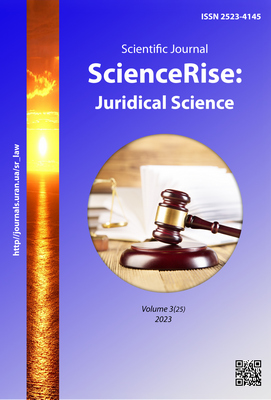Legal nature of freedom of will: fundamental ideas and definition
DOI:
https://doi.org/10.15587/2523-4153.2023.286533Keywords:
freedom of will, principles of law, autonomy of will, hilosophy of law, civil law, legal nature, law functions, system of law, freedom of will in law, legal ideaAbstract
The study aims to determine the legal nature of freedom of will, its definition and its place in the legal system as an idea, principle and norm. Research methods were chosen to consider the set goal and tasks: general and unique scientific methods of scientific knowledge of legal phenomena. In particular, the following research methods were applied: comparative-legal, formal-logical, systemic-structural, dialectical and others. These methods were used in their interdependence. The methodology contains information on philosophical aspects, methodological foundations of scientific knowledge, study of the structure and main stages of research. The paper examines the combination of two definitions, freedom and will, taking into account the legal specificity. The study proves that freedom in law is the possibility of behaviour not prohibited by law and the absence of coercion, except in cases, provided for by law. Will, in law, is the ability to control one's actions and manifestation from the outside, conscious regulation of one's behaviour, which is not limited to the legally defined possibility of behaviour. It is noted, that freedom has a passive character as the possibility of specific behaviour, and will is the active use of one's rights and opportunities. Will is the active use of freedom. The author emphasizes that although free will has a transcendent basis, it is inherent in law, confirmed by its global manifestation in legal science and practice. It is emphasized, that free will is a multi-layered, complex legal concept with a fundamental meaning. The position on the possibility of understanding freedom of will as a legal idea, an idea-principle, an idea-institute and an idea-norm that are not directly enshrined in normative legal acts, but reflected through the content of other legal institutions, principles and norms based on it, is substantiated. It is proved, that in the broadest sense, freedom of will in law is a legal idea, and the author's definition is proposed
References
- Fox, D., Stein, A. (2015). Dualism and doctrine. Indiana Law Journal, 90 (3), 975–1010. Available at: https://www.repository.law.indiana.edu/cgi/viewcontent.cgi?article=11156&context=ilj
- Schauer, F. (2015). Is law a technical language? San Diego Law Review, 52, 501–514. Available at: https://digital.sandiego.edu/cgi/viewcontent.cgi?article=1110&context=sdlr
- Hryshchuk, V. K. (2014). Antropolohichni osnovy vidpovidalnosti liudyny. Universytetski naukovi zapysky, 2 (50), 5–17.
- Yarmol, L. V., Vando, S. (2015). Poniattia, znachennia svobody ta yii vzaiemozv’iazok iz pravom. Visnyk Natsionalnoho universytetu "Lvivska politekhnika". Seriia: Yurydychni nauky, 825, 252–257.
- Herman, K. (2015). Development of the idea of freedom in philosophical and legal research. Pravo ta innovatsii, 3 (11), 115–123.
- Kovalenko, O. O. (2017). Volia i svoboda voli yak katehorii suchasnoho trudovoho prava. Vid hromadianskoho suspilstva – do pravovoi derzhavy. Kharkiv: Khark. nats. un-t imeni V. N. Karazina, 117–120.
- Kolber, A. J. (2016). Free will as a matter of law. Philosophical foundations of law and neuroscience. Oxford University Press, 9–28. doi: https://doi.org/10.1093/acprof:oso/9780198743095.003.0002
- Sikach, I. V. (1999). Pravova derzhava: Kontseptsiia B. Kistiakivskoho. Naukovyi visnyk Dyplomatychnoi akademii Ukrainy, 2, 223–230.
- Shkoda, V. V. (1997). Vstup do pravovoi filosofii. Kharkiv: Folio, 223.
- Svoboda. Akademichnyi tlumachnyi slovnyk ukrainskoi movy. Available at: http://sum.in.ua/s/svoboda
- Bychko, I. Svoboda. Filosofskyi entsyklopedychnyi slovnyk. Available at: https://slovnyk.me/dict/fes/свобода
- Shemshuchenko, Yu. (Ed.). (2003). Yurydychna entsyklopediia. Vol. 1. A–H. Kyiv: Ukrainska entsyklopediia.
- Punda, O. O. (2006). Pravo na svobodu. Khmelnytskyi: Evrika, 248.
- Losskyi, N. (1903). Osnovnie uchenyia psykholohyy s tochky zrenyia voliuntaryzma. Sankt-Peterburh: Typ. M. M. Stasiulevycha.
- Konstytutsiia Ukrainy No. 254k/96-VR (1996). Available at: https://zakon.rada.gov.ua/laws/show/254к/96-вр#Text
- Tatsii, V. Ya., Petryshyn, O. V., Barabash, Yu. H. et al. (Ed.) (2011). Konstytutsiia Ukrainy. Kharkiv: Pravo.
- Volia. Slovnyk ukrainskoi movy. Available at: http://ukrlit.org/slovnyk/%D0%B2%D0%BE%D0%BB%D1%8F
- Kachala, I. I. (2010). Kryminalna vidpovidalnist za vchynennia zlochyniv proty chesti ta hidnosti osoby. Aktualni problemy derzhavy i prava, 55, 248–252.
- Danylian, O., Dzoban, O. (Ed.) (2017). Filosofiia prava. Kharkiv: Pravo, 448.
- Gorecki, J. (1987). Human Rights: Explaining The Power of a Moral and Legal Idea. The American Journal of Jurisprudence, 32 (1), 153–169. doi: https://doi.org/10.1093/ajj/32.1.153
- Simmonds, N. E. (2008). Jurisprudence and the nature of law. Law as a moral idea. Oxford University Press, 1–36. doi: https://doi.org/10.1093/acprof:oso/9780199552191.003.0001
- Pavlenko, D. (2008). Pryntsyp dobrosovisnosti v dohovirnykh zobov’iazanniakh. Naukovo-doslidnyi instytut pryvatnoho prava i pidpryiemnytstva.
- Bachynyn, V. (1999). Fylosofyia prava y prestuplenyia. Kharkiv: Folyo, 224.
- Ehman, R. (1961). The Ideas of Reason. The Review of Metaphysics, 15 (2), 225–235. Available at: http://www.jstor.org/stable/20123876
- Varii, M. (2009). Psykholohiia. Kyiv: Tsentr uchbovoi literatury, 1007.
Downloads
Published
How to Cite
Issue
Section
License
Copyright (c) 2023 Viktor Savchenko

This work is licensed under a Creative Commons Attribution 4.0 International License.
Our journal abides by the Creative Commons CC BY copyright rights and permissions for open access journals.
Authors, who are published in this journal, agree to the following conditions:
1. The authors reserve the right to authorship of the work and pass the first publication right of this work to the journal under the terms of a Creative Commons CC BY, which allows others to freely distribute the published research with the obligatory reference to the authors of the original work and the first publication of the work in this journal.
2. The authors have the right to conclude separate supplement agreements that relate to non-exclusive work distribution in the form in which it has been published by the journal (for example, to upload the work to the online storage of the journal or publish it as part of a monograph), provided that the reference to the first publication of the work in this journal is included.









